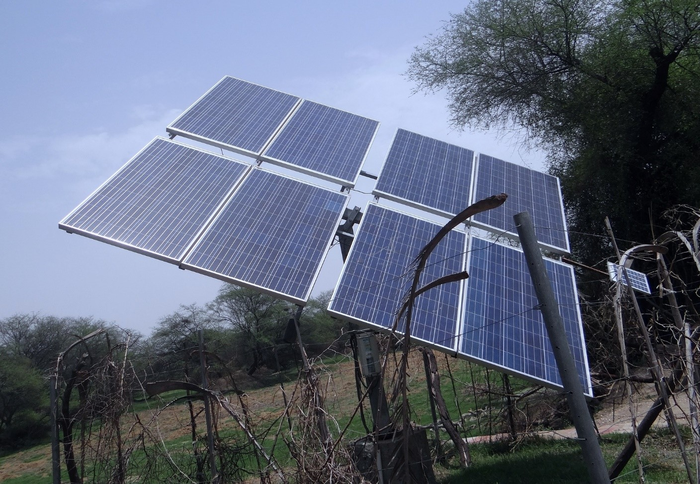Across the globe, nearly 789 million people still do not have access to electricity. This problem has been powering a faster shift toward sustainable energy solutions, such as solar and wind power.
 Off-grid solar panels in India. Image Credit: Bishnu Sarangi.
Off-grid solar panels in India. Image Credit: Bishnu Sarangi.
For the Indian Government, it is a top priority to provide sustainable energy to the 64 million Indians who do not currently have access to it. Solar energy, specifically, has a crucial role in this energy transition.
At present, off-grid solar systems allow Indian consumers to power small appliances like mobile phones; they can even power entire homes, such as lighting, fans and radios.
Until now, there have been very few studies into the effect of product standards on the quick dissemination of solar technologies. A new study reported in the KeAi journal Global Transitions discusses a study by researcher Matthias Galan of how neutral product standards are turning political with respect to the Indian off-grid solar industry.
The Indian energy transition represents an important cornerstone in achieving the United Nations’ Sustainable Development Goals, particularly goal #7, sustainable energy for all. The transition’s success relies on efficient governance of green technologies, in which the adherence to product standards plays a crucial role.
Matthias Galan, Vienna University of Economics and Business
Galan interviewed 33 Indian and international industry experts for his study, and they debated that the existing variation in product standards between India and other parts of the world has led to a lack of clarity around quality needs for Indian manufacturers.
Thus, Indian product standards for off-grid solar systems have been a barrier to the country’s energy transition. These barriers can lead to an increase in the costs for manufacturers to conform to the different testing standards and certification procedures. Meanwhile, the differences in product service levels can lead to mistrust among consumers.
Product standards cannot be understood as neutral, as their regulation has a political dimension. Competing public and private interests prevent a faster uptake of renewable energy due to regulatory gaps in standard harmonisation.
Matthias Galan, Vienna University of Economics and Business
“The public and private sectors should come together to increase coordination in technology governance, improve guidance on product standards, and engage in a structured stakeholder dialogue to regulate product standards. This would enable manufacturers to introduce off-grid solar systems that better address the energy needs of Indian customers,” concluded Galan.
Journal Reference:
Galan, M (2021) Role of product standards in the acceleration of the Indian energy transition: The case of the Indian off-grid solar sector. Global Transitions. doi.org/10.1016/j.glt.2021.08.001.